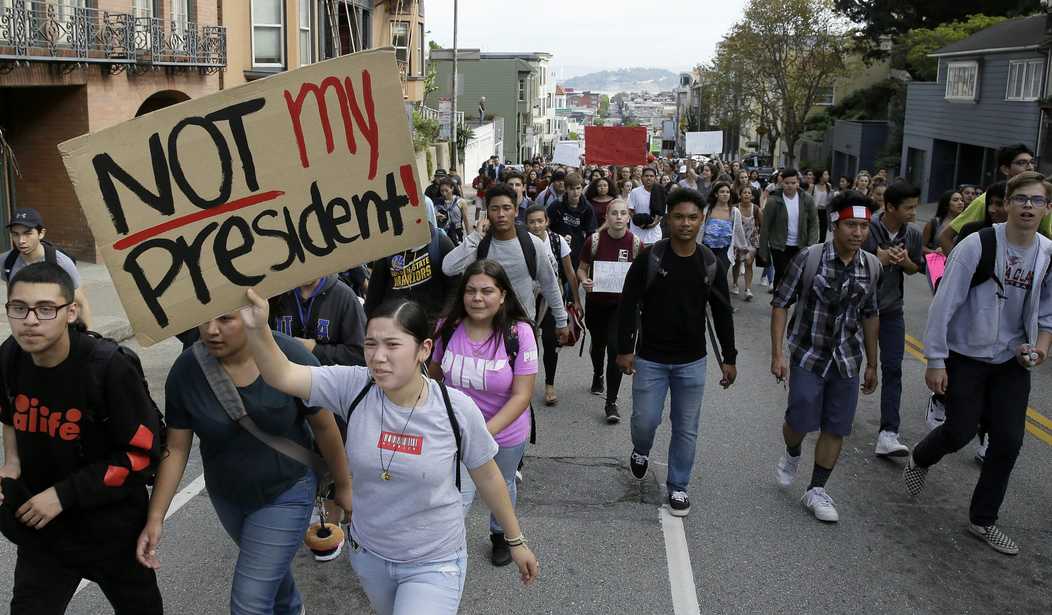If you’re like most American citizens, you’ve probably already personally confronted the place on the President Donald Trump love-hate spectrum that is opposite of yours. It may involve friends, family, coworkers, and even strangers. The singular characteristic of this dichotomy—though there are many points on the spectrum that are not absolute–is a polarized opinion of our new commander in chief.
Possibly the prickliest dynamic will be the interface between conservative parents and progressive-minded young adult children who have been steeped in a milieu of academic and cultural anti-conservatism. Such children—whether in public or private schools—have been propagandized by subtle or explicit disparagement of conservative viewpoints and ideologies since kindergarten. Continuing in elementary school, they were conditioned to accept without question the evils of right-leaning values and ideologies.
As they grew and became politically aware in high school, it is likely that the professionals charged with their education doubled down with a liberal groupthink mentality. By the time these kids enter college they will have been subjected to a relentless barrage that demonizes even moderate conservatism, while methodically casting liberalism in propitious and humanistic lights. Once in the halls of higher academia, a progressive, conservative-bashing bias will often be set in stone.
Even if there has been counterbalance in the home, like the Fox News prime time every night, Rush on the car radio, and the demonstration of everyday examples of conservative positivism by parents, extended family, friends, and faith communities, the combination of academic lockstep, cultural progressive hegemony, and peer pressure may present a near-insurmountable challenge to traditionally-minded conservative parents whose children have been inextricably shaped by the Democrat village.
If young adult children are either freshly out in the world or on the precipice of going there, and the prospect of President Donald Trump has them shocked, confused, and fearful about the next 4-8 years, there are some strategies to deploy that might help parents negotiate the social biases that knee-jerk progressivism has inculcated in much of the millennial generation.
The first psychological tactic may seem obvious, but should not be neglected. Let them experience their fears of the new administration while at the same time assuring them that they will have to do a lot worse than loathe Trump to make you stop loving them. Allowing adolescents and young adults to know that they’re not expected to jettison wholecloth the biases they’ve absorbed by osmosis from the larger culture enables them to process fears—and possible doubts about the way they’ve been educated—in the secure emotional environment of parental acceptance.
A second approach would be to discuss with them times in the past when you (in their minds, the misguided conservative parent) crossed the political aisle and supported someone from the “other” side. A personal example would be my only vote ever for a Democrat, Bill Clinton in 1992 (I beat a path back to Senator Robert Dole in 1996). Showing liberally-oriented young adults that a staunchly conservative Republican parent was flexible enough to vote for a Democrat facilitates the possibility of reciprocal ideological openness, and undermines suspicions of dogmatic rigidity. A conceptual nuance is introduced to their thinking, on the chance, however far-fetched it may seem at the moment, that they might someday be inclined to support a Republican, or recognize inchoate conservative values in themselves.
Finally, and most timely, a Trump–supporting parent with traumatized progressive children can respectfully suggest that perhaps Mr. Trump is not the monster that the left is making him out to be. It might further be suggested to children indoctrinated by liberal progressivism from their earliest development that it is possible that Trump’s presidency will be good for them, will indeed make their lives better in ways that are long overdue.
Along these lines, it may be fruitful to remind them of the Reagan years: a president who similarly put America and American ideals first, who won votes across the political spectrum while winning two of the top ten electoral landslides in our history, and stands as one of our greatest presidents.
One final note about the insufferably bad sportsmanship displayed by many Democrats in the wake of their resounding loss: Each conservative parent must reach his own decision about whether to highlight this aspect of Trump’s victory, which in my opinion is a national embarrassment.
This Christmas, an email went out from the family who hosted our holiday gathering that political discussion of any kind was verboten. Our family is just as spilt as our nation on Trump and, more broadly, pretty much cancel each other out each Election Day. But everybody toed the line, and the party came off without any untoward disagreements.
In attendance were all of our family’s contributions to the millennial generation, including two of my own, not one of whom was doing any back flips on that historic night when President-elect Trump smashed the Blue Wall to smithereens. To them, I would say: it’s going to be all right, kids. You’re going to have opportunities and advantages undreamed of during the years of a more conservative, populist, nationalist Trump administration.
If I didn’t believe that, I would never have voted for the man you have been taught to fear.









Join the conversation as a VIP Member